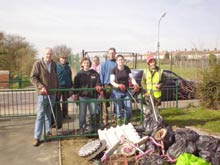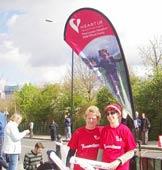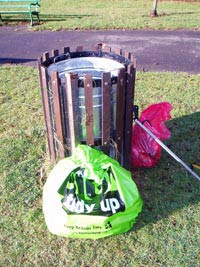The Benefits of Voluntary Work - Healthy Life Essex
Home » Articles » Volunteering » The Benefits of Voluntary Work
 The Benefits of Voluntary Work
The Benefits of Voluntary Work
Sharon Cattermole has amassed an amazing number of volunteering experiences – including writing and blogging for Healthy Life Essex! The following article describes some of her volunteering roles, offering you the chance to share her sense of fun and achievement. The sheer volume of support Sharon continues to offer to numerous charities in Essex is inspirational, but even if you only have a few hours spare time each month there are suitable volunteering opportunities available. So do read Sharon’s story and be inspired!
After leaving my job in January 2008, I decided to do some voluntary work but was unsure how to get involved. However, having spent 16 years in an office, conservation work really appealed.
I’d picked up a Groundwork leaflet from the library and attended my first task day at Hadleigh Castle Country Park clearing scrub from bluebells. I was nervous, but the Greengrid Taskforce Officer and volunteers were very friendly and made me welcome. Since then I’ve attended other task days building hedges, litter picking and coppicing. I have also represented Groundwork at community open days and contributed articles to the newsletter.
 Just after becoming a Greengrid volunteer, I started my own litter crusade along the Prittle Brook. Via the internet, I ordered equipment from environmental groups CPRE (Campaign to Protect Rural England) and People Clearing Litter and in April 2009, led the first monthly Prittle Brook Community Group litter pick. Within six months we had collected 32 bags of rubbish, adding to my own collection of 104 bags. Leigh Town Council have recognised our efforts and presented us with their Good For Leigh Award.
Just after becoming a Greengrid volunteer, I started my own litter crusade along the Prittle Brook. Via the internet, I ordered equipment from environmental groups CPRE (Campaign to Protect Rural England) and People Clearing Litter and in April 2009, led the first monthly Prittle Brook Community Group litter pick. Within six months we had collected 32 bags of rubbish, adding to my own collection of 104 bags. Leigh Town Council have recognised our efforts and presented us with their Good For Leigh Award.
As a sufferer from dystonia and member of the UK based charity, I became fundraising manager for the local support group, and have contributed to forums and attended AGMs. I also network with other Dystonia support groups, exchanging ideas on fundraising activities and ways of coping with the condition via newsletters and blogs. In the autumn of 2008, I was invited to join the Dystonia Society’s Communications Committee in London.
 As my confidence grew, I looked for opportunities where I could use my literacy and communication skills and signed up as a Bookstart volunteer. Every baby between 7 and 9 months and all pre-school children are entitled to a free book start pack. I explain the scheme to the parent or guardian, complete a questionnaire and hand over the book pack.
As my confidence grew, I looked for opportunities where I could use my literacy and communication skills and signed up as a Bookstart volunteer. Every baby between 7 and 9 months and all pre-school children are entitled to a free book start pack. I explain the scheme to the parent or guardian, complete a questionnaire and hand over the book pack.
My love of literature extends to the theatre, and while checking this year’s season at The Globe, I registered as a volunteer. So far I have stewarded eight performances. My duties have included checking tickets, selling programmes, showing patrons to their seats, reminding them of theatre regulations and answering ad-hoc questions. The atmosphere is electric and it’s a wonderful way of making new friends; on induction day, I met another lady from Leigh and we travel to London together for our sessions. Travel expenses up to £8.00 are reimbursed, free refreshments are provided during break times and if I cover a matinee and evening performance on the same day a free meal is provided.
This experience is stretching my memory, exercising my powers of observation and helping me ‘think on my feet.’
 The rota is organised so stewards get to watch at least one performance of a play. I have seen Romeo & Juliet three times, watched Paul McGann and Matthew Kelly on stage and was an ‘extra’ with other stewards, in a scene for a new St Trinian’s film. I would recommend theatre work even for one season; many venues need people to sell ice-creams, or envelope mail shots.
The rota is organised so stewards get to watch at least one performance of a play. I have seen Romeo & Juliet three times, watched Paul McGann and Matthew Kelly on stage and was an ‘extra’ with other stewards, in a scene for a new St Trinian’s film. I would recommend theatre work even for one season; many venues need people to sell ice-creams, or envelope mail shots.
My other voluntary roles include working in a charity shop, distributing envelopes and programmes for community events, Beach Watch surveys, writing campaign letters for the RSPB, helping at the BBC RaW Tour in Romford, organising MacMillan Coffee mornings, supporting HEART UK runners at the 2008 London Marathon and helping my goddaughter with her literacy and numeracy.
Libraries and community centres display posters for many organisations and the internet is a great source of information. I found these websites very useful:
| www.savs-southend.org (Tips on local volunteering, opportunities, training courses) |
www.timebank.org.uk (Fact sheets, volunteer stories and ways of volunteering) |
| www.voluntaryarts.org (Tips, events listings, and opportunities to volunteer in the arts sector in projects like The Big Draw) |
www.environmentjob.co.uk (A good source of paid and voluntary work nationwide and worldwide) |
| www.do-it.org.uk (Winner of Nominet Best Practice Challenge 2008) (Top Ten Tips on volunteering and how to work out what you want to do) |
|
Voluntary work offers invaluable benefits and opportunities; it has helped me regain confidence, I have tried new things and my social life has improved; I have discovered areas of Essex such as Doggetts Wildlife area, Norsey Woods, and Chafford Gorge I never knew existed.
According to the Charity Times, more than a quarter of the UK (28 per cent) is taking time out to volunteer at least once a month. Studies have also shown that volunteering can lower rates of heart disease and depression and a three hour conservation task can equal the energy expended during a step aerobic class.
Many volunteers are taken on by organisations as paid employees; voluntary work is a gateway to opportunity and a way for students and school leavers to gain experience in a chosen field and improve their life skills. Team-working, problem solving, and the ability to communicate well are skills that employers look for and the organisation you volunteer with can provide a work-based reference. Voluntary work may also help you decide whether a career move is the right one for you.
 A number of organisations such as the BCTV and the National Trust offer conservation holidays. This is a great way of helping to improve an area, meeting like-minded people and taking advantage of a low cost break with family and/or friends. An alternative for the less active could be campaigning; the RSPB, Friends of the Earth and the WWF always need volunteers to email or write to government bodies on environmental issues.
A number of organisations such as the BCTV and the National Trust offer conservation holidays. This is a great way of helping to improve an area, meeting like-minded people and taking advantage of a low cost break with family and/or friends. An alternative for the less active could be campaigning; the RSPB, Friends of the Earth and the WWF always need volunteers to email or write to government bodies on environmental issues.
Many charities offer corporate task days which benefit the community and improve staff motivation. (A survey carried out by TimeBank through Reed Executive showed that among 200 of the UK’s leading businesses 94% of employers said that volunteering can add to work based skills.) Fees charged for corporate days often help to fund the other work of the charity.
Some organisations offer free or subsidised courses to volunteers, most pay travel expenses and the chance to attend special events for free or at a discount. It’s wonderful to give something back to the community and feel valued. Voluntary work is rewarding and liberating. If you have a work based skill, a hobby or something you are passionate about, it could be invaluable in a voluntary capacity. Mentoring, befriending, acting as a school governor or trustee, are important roles in the community that draw on specialist skills which you may have.
So why not be brave and volunteer for something – you’ll be surprised at the difference it will make!
By Sharon Cattermole
Sharon is a ‘serial volunteer’ and regular contributor to the Healthy Life Essex Blog
Find out more about Sharon from her article on Dystonia
Based on a page layout by Sara Thomas – Healthy Life Essex volunteer.
